Human Metapneumovirus (HMPV) is a respiratory virus increasingly recognised for causing acute respiratory infections. While it may not be as well-known as influenza or RSV (Respiratory Syncytial Virus), its impact can be significant, especially among vulnerable populations. Let’s explore what HMPV is, its symptoms, who is most at risk, and how to manage and prevent infections.
What is Human Metapneumovirus (HMPV)?
HMPV belongs to the Paramyxoviridae family and was first identified in 2001. It primarily affects the respiratory system and can cause a range of illnesses, from mild cold-like symptoms to severe respiratory distress. The virus spreads through respiratory droplets, making it highly contagious, particularly in crowded or enclosed environments.
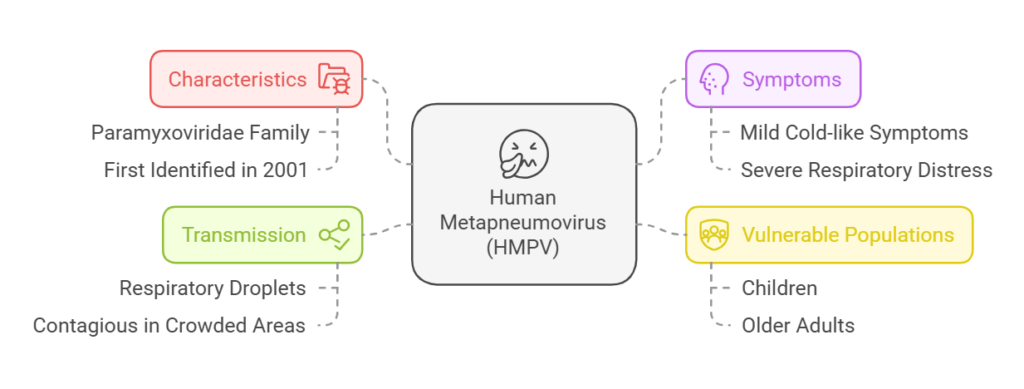
Common Symptoms of HMPV
HMPV symptoms resemble those of other respiratory viruses, which can make diagnosis challenging. Typical symptoms include:
- Fever: Moderate to high fever is common.
- Cough: Persistent, often dry cough.
- Nasal Congestion: Runny or blocked nose.
- Fatigue: General tiredness or lack of energy.
In more severe cases, particularly in infants, elderly individuals, and those with weakened immune systems, the virus can cause:
- Wheezing
- Shortness of Breath
- Rapid Breathing
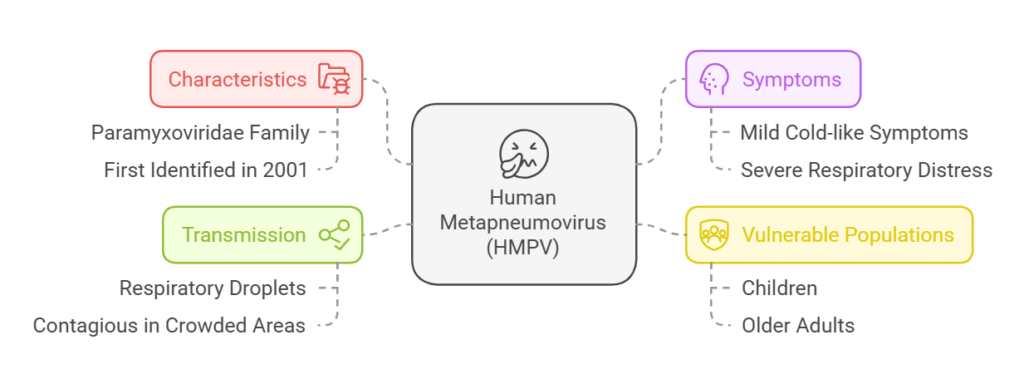
Who is Most at Risk?
While anyone can contract HMPV, certain groups are more susceptible to severe outcomes:
- Infants and Young Children: Developing immune systems are less equipped to fight the virus.
- Elderly Individuals: Age-related immune decline increases vulnerability.
- Immunocompromised Individuals: Those undergoing treatments like chemotherapy or living with conditions like HIV/AIDS.
- People with Chronic Respiratory Conditions: Such as asthma or chronic obstructive pulmonary disease (COPD).
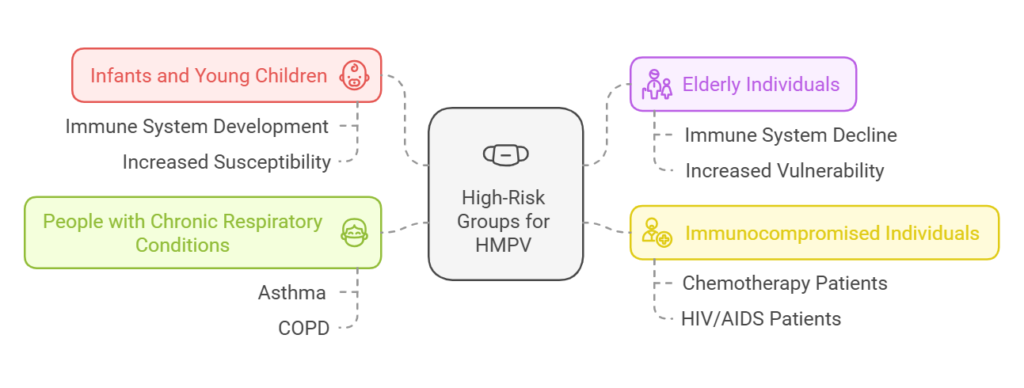
Diagnosis and Treatment
- Diagnosis: Laboratory tests, such as PCR (Polymerase Chain Reaction), are used to identify the virus in respiratory samples.
- Treatment: There is currently no specific antiviral treatment for HMPV. Management focuses on relieving symptoms:
- Hydration: Drink plenty of fluids.
- Rest: Ensure adequate recovery time.
- Medication: Use over-the-counter medications for fever and pain as prescribed by a healthcare provider.
Severe cases may require hospitalisation for oxygen therapy or ventilatory support.
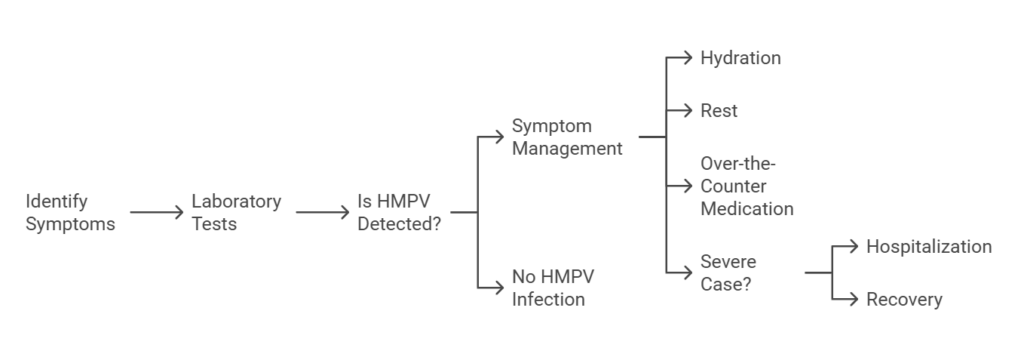
How to Prevent HMPV
- Good Hygiene Practices:
- Wash hands frequently with soap and water for at least 20 seconds.
- Use hand sanitiser when soap and water are unavailable.
- Avoid Close Contact:
- Stay away from people who are visibly sick.
- Avoid sharing utensils or personal items with infected individuals.
- Respiratory Etiquette:
- Cover your mouth and nose with a tissue or elbow when coughing or sneezing.
- Regular Cleaning:
- Disinfect frequently touched surfaces like doorknobs, phones, and toys.
- Vaccination:
- While no vaccine exists for HMPV, staying up to date with vaccines for other respiratory illnesses can reduce overall risk.

When to Seek Medical Attention
Seek immediate medical care if the following symptoms occur:
- Severe difficulty in breathing.
- Persistent high fever that does not respond to medication.
- Signs of dehydration, such as reduced urination or dry mouth.
- Bluish skin or lips, indicating oxygen deprivation.
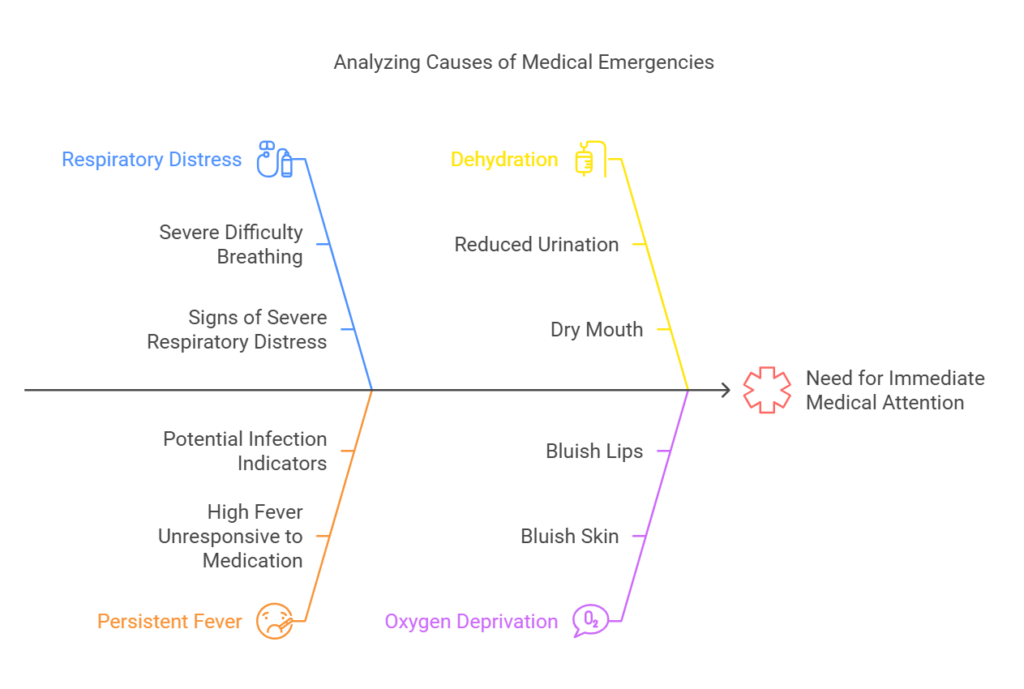
The Bigger Picture
Understanding HMPV and taking proactive steps can prevent severe complications and limit its spread. While research into vaccines and targeted treatments continues, maintaining vigilance through good hygiene, early symptom recognition, and appropriate medical care remains our best defence against this virus.
By staying informed and cautious, we can protect not only ourselves but also the most vulnerable members of our communities.
Sources
- Centers for Disease Control and Prevention (CDC): Human Metapneumovirus
- World Health Organization (WHO): Respiratory Infections
- Apollo Hospitals: Human Metapneumovirus (HMPV)
- National Institutes of Health (NIH): HMPV Research
- Mayo Clinic: Respiratory Virus Symptoms and Treatments















